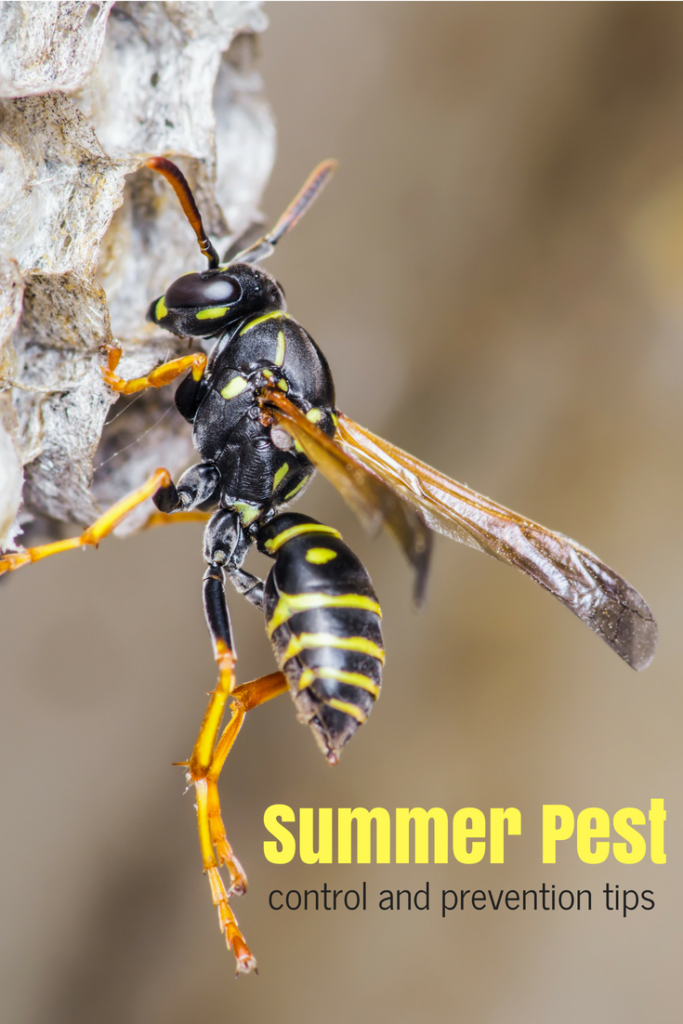Summer is? such a great time of year – full of playing outdoors, relaxing on the patio and having barbecues with family and friends. Unfortunately, all too often, we get those unwanted guests that wreck havoc on our summer fun. But don’t fret, because I’m sharing some summer pest control and prevention tips to help keep those pesky bugs at bay. I?ve partnered with Wil-Kil Pest Control for this article. As always, opinions are my own.

summer pest control and prevention
There are many summer pests but some of the worst and most annoying are definitely mosquitoes, stinging insects and ticks, so I will focus on those today. Last week, I shared some tips on protecting your home from ant season that you will want to check out and next week I’ll share some tips on preventing pests while entertaining outdoors.
Mosquitos
Mosquitoes are quite a nuisance and seem to be everywhere you turn this time of year. I know our yard gets horrible and sometimes we can’t even stand to be out there. Luckily, there are ways that you can enjoy a mosquito free summer!
- Get rid of standing water. It’s a breeding ground for mosquitoes and you will want to dump pots, toys and garden equipment after a rainfall.
- Light mosquito-repelling candles. They can help minimize the presence of mosquitoes to provide temporary relief.
- Douse yourself in repellent. Seriously, if they’re that bad, repellent is the way to go. We always make sure to have plenty on hand because I’d rather risk smelling unpleasant than getting bitten a hundred times.
- Seek help from a professional. Since over the counter yard sprays can be dangerous, it’s best to call in the pros.?Wil-Kil Pest Control can treat treat the areas where mosquitoes rest and breed to minimize the problem without excessive use of chemicals. Their products are EPA registered for pest control and? Wil-Kil also offers ongoing mosquito control services so that you can live mosquito free all summer long.

Stinging insects
Stinging insects like bees, wasps and hornets are not only annoying creatures, they can also be life-threatening. My husband is actually allergic to Bald faced Hornets and had a very close call a few year sago, after being stung. Here are some ways that you can control and possibly prevent these stinging insects from living and breeding in your yard.
- Keep a well-maintained yard. Bees and wasps not only make their nests up high, but also in tree stumps and burrowing in the ground. Eliminating the overgrown areas in your yard will help minimize the population of stinging insects.
- Reduce flowers. They’re pretty, but they are also a source of pollen for bees, so if flowers are a must, then plant them further away from the house or gathering areas.
- Keep food and drinks covered. Bees, wasps and hornets are attracted to the smells of your food and beverages, so keep those things covered and make sure that the garbage can is away from the main gathering area.
- Check your deck. Check underneath your deck regularly for signs of nests.
Ticks
The tick population is expected to explode this year and that’s nothing to take lightly. The upper Midwest has a large population of the wood or dog tick and the deer or blacklegged tick. The?deer or blacklegged tick is the most dangerous and are quite tiny, often compared the the size of a poppy seed. They can carry and infect you with some pretty serious illnesses, so it’s important to take preventative measures.
- Keep a well-maintained yard. Ticks like to live in tall grass and heavy brush, but also lay their eggs in old leaves, so make sure you clean up good after the autumn leaves fall!
- Use tick repellent. Ideally, something that contains 0-50% DEET or 0.5% permethrin is best.
- Protect your pets. Ask your veterinarian to recommend a product to protect your pets.
- Treat your yard.?Wil-Kil Pest Control?can apply a landscape treatment that target adult and immature ticks.
Wil-Kil Pest Control?can help you with all of your summer pest control needs. Call in the pros before it’s too late. They are available to service the Milwaukee, Appleton, Eau Claire, and Madison areas.